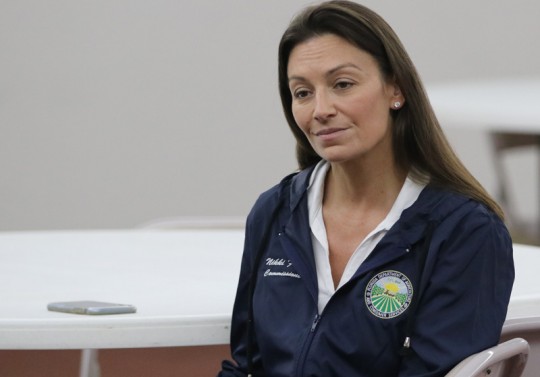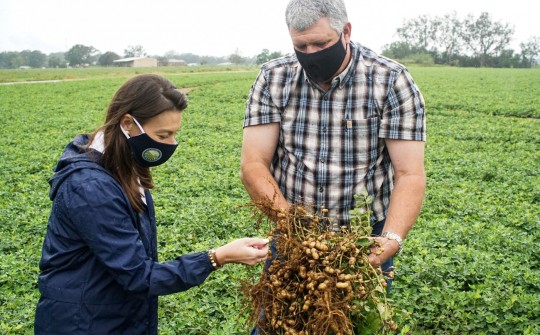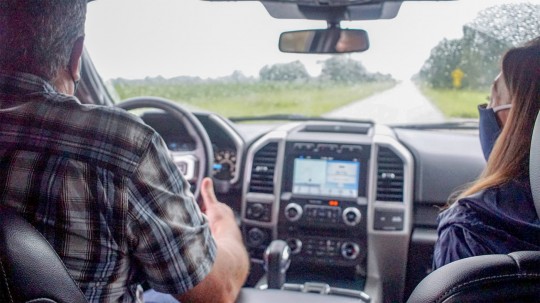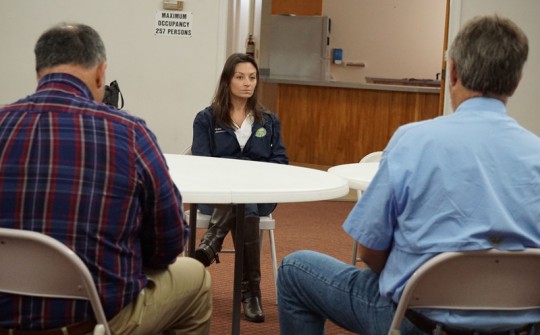Nikki Fried: Individuals Need Help Now Following Hurricane Sally
October 2, 2020
Updated: Individual Assistance was approved Friday morning.
BY NIKKI FRIED,
FLORIDA COMMISSIONER OF AGRICULTURE AND CONSUMER SERVICES
People often say they’ll “never forget” when a major hurricane comes through their town. I certainly can’t forget Hurricane Andrew as a scared teenager in 1992, when it tore through my Miami hometown. The families of the 1,833 souls lost in Hurricane Katrina need no reminder. And residents of the Florida Panhandle absolutely won’t forget Hurricane Michael roaring ashore in 2018, downing an estimated 550 million trees.
Hurricane Sally is no different. Thousands of North Floridians won’t ever forget it. But our federal government is forgetting them.
As the Category 2 storm dumped up to thirty inches of rain across the region along with 105-mph winds, it became clear that not only homes and businesses would be imperiled, but also hundreds of thousands of acres of farmland, drowning millions of crops.
 Helping people recover in the immediate aftermath of major disasters like hurricanes is exactly what the federal government is supposed to do, through the Federal Emergency Management Agency and other federal partners. They provide not only the blankets and tarps, but the financial assistance needed to help communities get back on their feet.
Helping people recover in the immediate aftermath of major disasters like hurricanes is exactly what the federal government is supposed to do, through the Federal Emergency Management Agency and other federal partners. They provide not only the blankets and tarps, but the financial assistance needed to help communities get back on their feet.
But this time might be different. For the first time in modern U.S. history, it appears that federal help for individuals might not be coming. It’s completely inexplicable.
When President Trump issued a Major Disaster Declaration a week after the storm on September 23, it was narrowly tailored to send federal aid for debris removal and infrastructure only to local governments, and only in Escambia County. This leaves out not only the dozen other North Florida counties impacted by Hurricane Sally, but also local residents themselves needing help, including farmers facing 100 percent losses.
It defies reason. Local leaders are exasperated. State Senator Doug Broxson called it “very disappointing.” Pensacola Mayor Grover Robinson noted people “have nowhere else to go” for help with food. Escambia County Commission Chairman Steven Barry said it’s “unfair to our citizenry.” Residents called it “a slap in the face.” They’re all correct.
The very next day I reiterated my request to the President, asking him to expand his Major Disaster Declaration to provide aid not only to all of the region’s affected counties, but to the men and women who live and work here, suffering and needing help. There’s simply no reason why he should turn his back on Americans in their time of need.
Meanwhile, the region’s farms remain drenched, with 100,000 acres each of peanuts, cotton, and hay impacted by the storm, as well as 10,000 acres of corn, 4,000 acres of horse farms, and many other important crops including pecans, walnuts, timber, and aquaculture. Federal aid is critically needed here as well, and fast – but there’s a hold-up.
Federal assistance for farmers can come from the U.S. Department of Agriculture, through a Secretarial disaster declaration. Under federal law, this must be requested by a Governor, or by the USDA Farm Service Agency’s state director.
I immediately wrote to Governor DeSantis, asking him to request this of Agriculture Secretary Sonny Perdue. I asked him again at our meeting of the Florida Cabinet last week. And I wrote to Senators Rubio and Scott, as well as Representatives Dunn, Gaetz, and Lawson, offering our department’s support of additional disaster relief.
Until the Governor properly requests the disaster aid from the USDA, it will be slow in coming, if at all. After waiting two years for Hurricane Michael timber and irrigation grants to be negotiated and bureaucratized, the last thing Panhandle residents and farmers need is another agonizing wait for federal assistance. The scars from those delays remain as real as the 72 million tons of timber felled by that storm.
From floods to hurricanes, North Floridians have been resilient. It’s a testament to their grit and determination. But as leaders, it’s our job to help our people when they need it most. And with agriculture as the Panhandle’s leading industry, the economy won’t recover without timely assistance.
We expect people to be self-reliant, to pick themselves up by their bootstraps. But we pay taxes for a reason. We need the President, the Governor, and the federal government to get to work, get aid to individuals, and get busy helping the Panhandle recover, replant, and rebuild.
We may “never forget” the storm. But neither should we forget what happens next.+
Pictured: Florida Commissioner of Agriculture and Consumer Services Nikki Fried talked with local farmers and had a chance to see crop devastation across northern Escambia and Santa Rosa counties Sunday, September 20. NorthEscambia.com and courtesy photos, click to enlarge.
Comments
3 Responses to “Nikki Fried: Individuals Need Help Now Following Hurricane Sally”






A link to the FEMA rules. I encourage to checkout item “B” under individual assistance and see the criteria that is used for determining if this assistance is approved.
https://www.fema.gov/disasters/how-declared
I chuckle every time I read comments insinuating the POTUS turned his back or failed those in need. The fact is that the current FEMA rules were last amended following Hurricane Sandy (2012)and they limit the authority of the POTUS and set requirements for what assistance could be provided following disasters. A large part of the process deals with insurance, what should have been insured, the local and states ability to pay for damages, and the fiscal impact of funds based on a states population. These rules applied to all disasters regardless of which state they may occur. If you are mad at the delay and feel the need to blame someone, just remember these rules were instituted by the Obama administration. Remember that come November.
It’s easy to read the rules for yourself. They can be found with a Google search for FEMA disasters rules.
November 3rd let them hear us